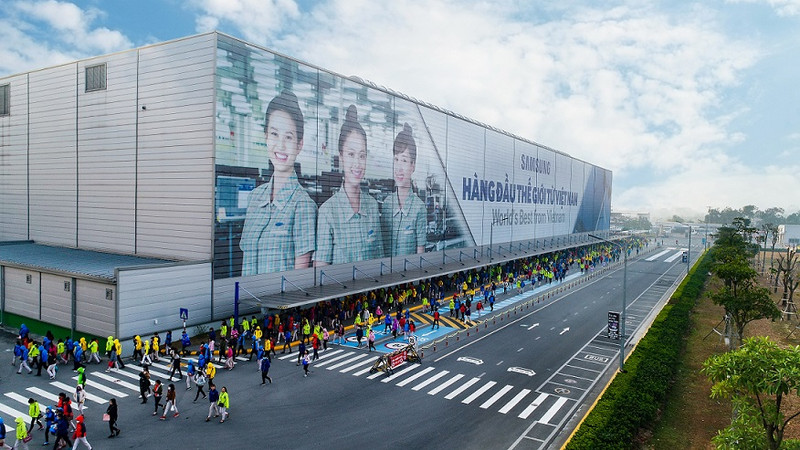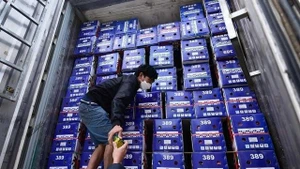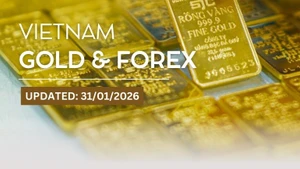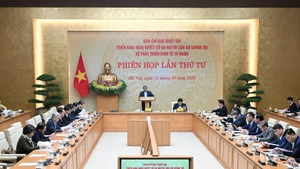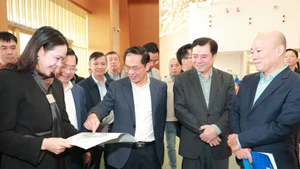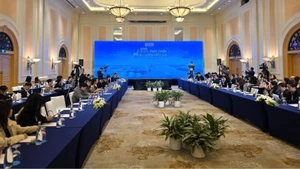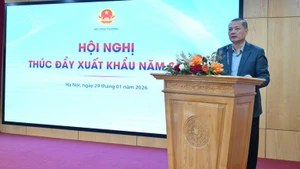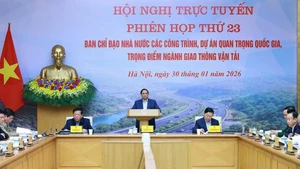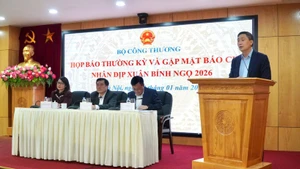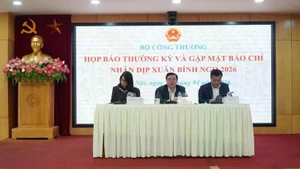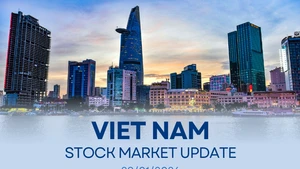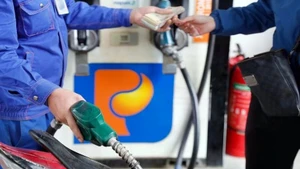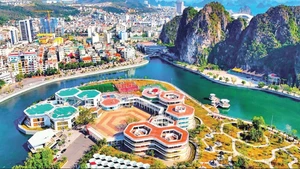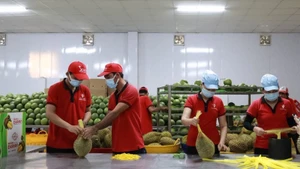On February 24, the Vinh Phuc Industrial Parks Management Board granted an investment registration certificate to IL San Precision Vina Company from the Republic of Korea to develop a 500,000 USD IL San Vina factory producing electronics products in the northern province’s Binh Xuyen Industrial Park (IP).
After becoming operational in April 2023, the factory will be able to churn out 400,000 products a year while contributing about 3 billion VND (130,440 USD) to the state budget annually and creating jobs for about 100 local workers.
This project is the 130th Korean-invested project in Vinh Phuc, raising the total Korean registered investment capital in the province to 2.24 billion USD, accounting for about 39% of total foreign direct investment (FDI) registered in Vinh Phuc’s Ips, which are now home to 350 foreign-invested projects with a total of 5.74 billion USD registered.
Earlier, on February 21, the Vinh Phuc Industrial Parks Management Board also granted a certificate to Italy’s Piaggio Vietnam to increase its investment capital by an additional sum of 75 million USD, raising its total investment capital in the province to 165 million USD.
This is the 14th time that Piaggio, which began investment in Vinh Phuc in 2007, has revised up its investment capital in the province, where it produces vehicles at two factories with the initial capital of 90 million USD. The two factories are located on an area of nearly 19 hectares at the Binh Xuyen IP and are employing about 1,000 workers.
Big expectation
According to the Vietnamese Ministry of Planning and Investment (MPI), Vinh Phuc is among many localities in Vietnam that are big magnets to foreign investors who are mulling over pouring billions of US dollars for large-scale projects there.
“Despite difficulties caused by disruptions in supply chains and geopolitical uncertainties, Vietnam remains attractive to foreign investors,” said Do Van Su, vice director of the MPI’s Foreign Investment Agency.
Specifically, in January when the Tet holiday took place and domestic production activities are almost halted, Vietnam lured 1.69 billion USD worth of FDI, down 19.8% year on year.
However, a bright spot could still be seen in the month with 153 newly registered projects, worth 1.2 billion USD. This is up 48.5% in the number of projects and 3.1 times in value. This means a signal to confirm the confidence of foreign investors in the investment environment of Vietnam, the FIA said.
Also in January, newly added capital from operational projects witnessed a year-on-year drop of 76% to 306.3 million USD, while capital contributions and stake purchases also fell 61% year on year to more than 174 million USD.
At the same time, FDI disbursement declined 16.3% to 1.35 billion USD in the first month, the FIA said, adding that the processing and manufacturing industry saw USD1.05 billion worth of foreign investment disbursed, making up 77.6% of the total.
In the January-February 20 period, total newly registered and newly added FDI and capital contributions and stake acquisitions in Vietnam hit 3.1 billion USD, down 38% year on year.
However, the newly registered capital touched 1.76 billion USD – up 2.8 times year on year. Meanwhile the newly added capital sat at 535.4 million USD – down 85.1% year on year, and capital contributions and stake acquisitions touched 797.9 million USD – up 3.7% year on year.
The MPI reported that accumulatively as of February 20, total newly registered and newly added FDI and capital contributions and stake acquisitions in Vietnam hit nearly 442.3 billion USD for over 36,600 valid projects.
According to the MPI, Vietnam is expected to lure in as much as 36-38 billion USD worth of newly registered FDI, newly added FDI, and FDI from capital contributions and stake acquisitions, up strongly from the figure of nearly 27.72 billion USD recorded last year. FDI will continue acting as one of the key drivers of economic growth.
The MPI is expecting that FDI disbursement in this year will likely reach as much as 22-23 billion USD, almost the same as 22.4 billion USD last year which was up 13.5% year on year.
According to MPI, the key factors for FDI to continue to increase this year will include economic growth results in 2022 and big efforts of the government, ministries, and localities in ameliorating the domestic business and investment environment, in addition to big advantages from free trade agreements which have been signed and taken effect. This will continue strengthening the confidence of businesses and investors.
One of the positive factors in Vietnam’s FDI landscape this year is that many projects registered last year will come into operation this year, helping create hundreds of thousands of labourers. Many large-scale projects had their capital adjusted up significantly in 2022. For instance, Samsung Electro-Mechanics Vietnam was given two capital boosts of 920 million and 267 million USD.
Samsung HCMC CE followed suit with 841 million USD. Foreign-invested initiatives to churn out electronics and multimedia devices in the localities of Bac Ninh, Haiphong, and Nghe An received additional investment capital of 306 million, 260 million, and 127 million USD, respectively.
Samsung Electronics has raised total investment in Vietnam to 20 billion USD, focusing on AI and big data. Meanwhile, LG will spend an additional 4 billion USD in Vietnam; and Hyosung will level up funding to 5 billion USD, up from 3.5 billion USD.
Key driver
The government has also underscored that Vietnam will attract FDI selectively based on ensuring environment and sustainability. FDI will continue acting as one of the key drivers of economic growth this year and beyond.
“Priorities will be given to projects with high added values and advanced technology in service of infrastructure development, digital economy, digital transformation, and green growth,” said the government’s Resolution No.21/NQ-CP on an action plan for the 2022-2026 period to implement the Party Secretariat’s Directive No.15-CT/TW, dated August 10, 2022, on boosting economic diplomacy in service of national development until 2030. Resolution 21 was promulgated on February 20, 2023.
“We will also focus on boosting economic diplomatic activities in order to lure in high-quality FDI from multinational corporations. This will help elevate Vietnam’s status in the global supply chains,” states Resolution 21.
Andrew Jeffries, ADB country director for Vietnam, said that there are also many reasons for optimism about Vietnam’s economic prospects in 2023.
“In Vietnam, economic activities recovered faster than expected following the removal of COVID-19 restrictions and the achievement of nationwide vaccine coverage,” Jeffries said. “Despite a volatile stock market last year, FDI has been strong and has even picked up. There is no doubt that Vietnam’s economic prospects for the medium and long term remain very positive.”
“FDI investors think long-term when they make their investments, and we noted that continued strong interest in Vietnam as an FDI destination. That clearly shows a long-term vote of confidence in the country. With sound economic fundamentals and strong leadership, we strongly believe that Vietnam will be able to brace the headwinds in 2023 and beyond,” Jeffries stressed.
MPI Minister Nguyen Chi Dung said that Vietnam had adopted a selective approach to attracting foreign investment inflow which will contribute to the country's implementation of the sustainable development strategy.
Priority will be given to projects using new and green technologies, with high added value, modern corporate governance, and high spill over effects, ensuring technology transfer, and being integrated with global supply and production chains, Dung said.
To lure more foreign investment, he emphasised the importance of developing innovation and financial centres at the regional and international levels, creating a driving force for socio-economic development in the coming period, adding that stabilisation of the macro-economy and improvements to infrastructure and the quality of human resources will be also needed.
A recent survey conducted by the MPI revealed that 76% of enterprises, both domestic and foreign enterprises reported that they are satisfied with the Vietnamese government’s support policies.
They were most satisfied with the VAT waiver and reduction policies, and those aiming to stabilise gasoline prices, improve the work permit issuance process and customs clearance procedures, and support import-export and workers’ livelihoods.
